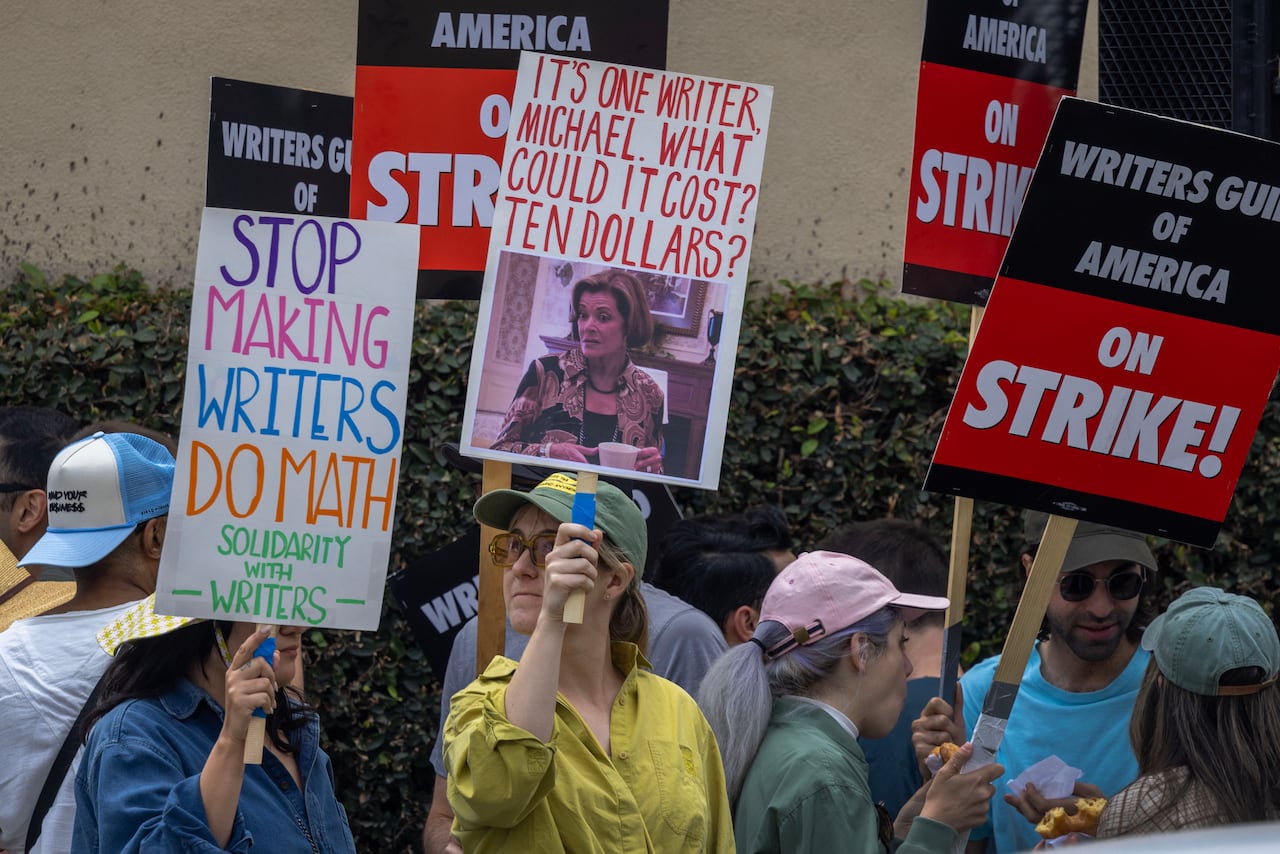Hollywood Production Halts: Joint Writers' And Actors' Strike Impacts Industry

Table of Contents
The Core Issues Fueling the Hollywood Strike
The Hollywood strike isn't just about pay; it's about fundamental changes in the industry, driven by the shift to streaming and the rise of AI.
Fair Compensation and Residuals in the Streaming Era
The transition from traditional media to streaming has fundamentally altered the compensation models for writers and actors. Traditional television and film relied on a system of residuals – payments made to actors and writers each time their work aired. Streaming services, however, often offer upfront fees with little to no residuals, despite potentially massive viewership. This has led to a significant decrease in income for many creatives.
- Decreased residuals: The move to streaming has drastically reduced or eliminated residuals for many actors and writers.
- Increased streaming viewership without corresponding pay: Shows with millions of viewers on streaming platforms may not generate the same revenue for actors and writers as a comparable show on traditional television.
- Demand for transparency in streaming revenue: Unions are pushing for greater transparency in how streaming services calculate and distribute revenue. The lack of transparency fuels mistrust and fuels the demand for fairer compensation.
AI and its Threat to Creative Professionals
The rise of artificial intelligence is another major concern. Both writers and actors fear that AI could be used to replace human creativity and labor, leading to job losses and a devaluation of their skills.
- Concerns about AI-generated scripts: AI can generate scripts, raising concerns about the future of screenwriting jobs.
- AI-driven performance capture: The potential use of AI to generate performances raises similar concerns about actors' employment.
- Demand for regulations on AI usage in the industry: Unions are pushing for regulations to protect creative professionals from being replaced by AI.
Working Conditions and Power Imbalances
The strike also highlights long-standing concerns about working conditions and the power imbalance between studios and creative professionals. Many actors and writers face unreasonable demands, including excessively long hours, insufficient healthcare benefits, and exploitative contracts.
- Unreasonable working hours: Many actors and writers report working excessively long hours, often without proper compensation.
- Inadequate healthcare benefits: The lack of comprehensive healthcare benefits is another significant concern for many creatives.
- Lack of negotiating power for individual creatives: Individual actors and writers often lack the bargaining power to negotiate fair contracts with powerful studios.
The Economic Fallout of the Hollywood Production Halt
The Hollywood strike has far-reaching economic consequences, affecting not only major studios but also local economies and related industries.
Impact on Production Companies and Studios
The production halt translates directly into significant financial losses for studios. Delayed and cancelled projects mean lost revenue, potential project failures, and even bankruptcy for smaller production companies.
- Loss of revenue: Studios are losing millions, even billions, in potential revenue due to production delays and cancellations.
- Delays in project releases: The release dates of numerous films and television shows are being pushed back, impacting marketing and distribution plans.
- Potential bankruptcy for smaller production companies: Smaller production companies are particularly vulnerable to the financial strain of the strike.
- Impact on post-production houses and special effects companies: Companies providing post-production services and special effects are also suffering from reduced work.
The Wider Economic Impact on Local Economies
The impact extends beyond Hollywood itself. Cities and towns heavily reliant on film and television production face significant economic downturns. This includes job losses for crew members, support staff, and related businesses.
- Reduced spending in local businesses: The absence of film crews leads to a decline in spending at local restaurants, hotels, and other businesses.
- Job losses for crew members and support staff: Thousands of individuals working in various capacities on film and television sets have lost their jobs or income due to the strike.
- Decline in tourism related to film production: Areas that attract tourists based on film locations see a decrease in visitor numbers and spending.
Potential Resolutions and Future of Hollywood Production
The ongoing negotiations between the unions and the studios are crucial in determining the future of the entertainment industry.
Negotiations and Potential Outcomes
Several scenarios are possible: a negotiated settlement, a prolonged strike, or a fundamental shift in the power dynamics of the industry. The negotiations center on fair compensation, AI regulations, and improved working conditions.
- Potential compromises on residuals: Finding a compromise on residual payments for streaming content is a key sticking point in the negotiations.
- AI regulations: Establishing clear guidelines for the use of AI in the industry is another important aspect of the negotiations.
- Working conditions: Improving working conditions, including working hours and healthcare benefits, is a major demand of the unions.
- The likelihood of a long-term solution: The outcome of the strike will have long-lasting implications for the industry.
The Long-Term Implications for the Entertainment Industry
The Hollywood strike could lead to significant changes in the industry structure and working practices. The increased unionization and improved negotiation power could lead to more equitable compensation and better working conditions.
- Possible reforms in compensation models: The strike may push for significant reforms in how actors and writers are compensated for their work in the digital age.
- Strengthened union power: A successful strike could greatly strengthen the negotiating power of the unions, leading to more favorable contracts for creatives.
- Changes in production practices: The strike might lead to changes in production schedules and working conditions.
- Increased use of independent productions: The strike could lead to a rise in independent film and television productions that are less dependent on major studios.
Conclusion
The Hollywood strike, driven by critical issues like fair compensation, AI integration, and working conditions, is causing significant and multifaceted disruption throughout the entertainment industry. The economic repercussions extend far beyond Hollywood, impacting local economies and potentially reshaping the industry's future. The resolution to this historic Hollywood strike is crucial, and the outcome will undoubtedly influence the landscape of film and television production for years to come. Staying informed about the evolving situation and understanding the core issues driving the Hollywood strike is vital for anyone interested in the future of the entertainment industry. Keep up to date with the latest developments in the ongoing Hollywood strike to understand its long-term effects on film and television production.

Featured Posts
-
 Nyt Mini Crossword Hints And Answers Sunday April 19th
May 24, 2025
Nyt Mini Crossword Hints And Answers Sunday April 19th
May 24, 2025 -
 Onlayn Translyatsiya Tennisnogo Matcha Rybakinoy Na Turnire S Prizovym Fondom 4 Milliarda
May 24, 2025
Onlayn Translyatsiya Tennisnogo Matcha Rybakinoy Na Turnire S Prizovym Fondom 4 Milliarda
May 24, 2025 -
 Escape To The Country Top Destinations For A Tranquil Getaway
May 24, 2025
Escape To The Country Top Destinations For A Tranquil Getaway
May 24, 2025 -
 Rethinking Middle Management Their Vital Role In Modern Organizations
May 24, 2025
Rethinking Middle Management Their Vital Role In Modern Organizations
May 24, 2025 -
 Moje Doswiadczenia Z Porsche Cayenne Gts Coupe Warto Kupic
May 24, 2025
Moje Doswiadczenia Z Porsche Cayenne Gts Coupe Warto Kupic
May 24, 2025
Latest Posts
-
 2025 Memorial Day Sales Expert Curated Deals And Discounts
May 24, 2025
2025 Memorial Day Sales Expert Curated Deals And Discounts
May 24, 2025 -
 Best Memorial Day Sales And Deals Of 2025 Shopping Editors Top Choices
May 24, 2025
Best Memorial Day Sales And Deals Of 2025 Shopping Editors Top Choices
May 24, 2025 -
 2025 Memorial Day Sales Best Deals Handpicked By A Shopping Editor
May 24, 2025
2025 Memorial Day Sales Best Deals Handpicked By A Shopping Editor
May 24, 2025 -
 Top Memorial Day Sales And Deals 2025 Expert Picks
May 24, 2025
Top Memorial Day Sales And Deals 2025 Expert Picks
May 24, 2025 -
 Best 2025 Memorial Day Sales And Deals A Shopping Editors Guide
May 24, 2025
Best 2025 Memorial Day Sales And Deals A Shopping Editors Guide
May 24, 2025
